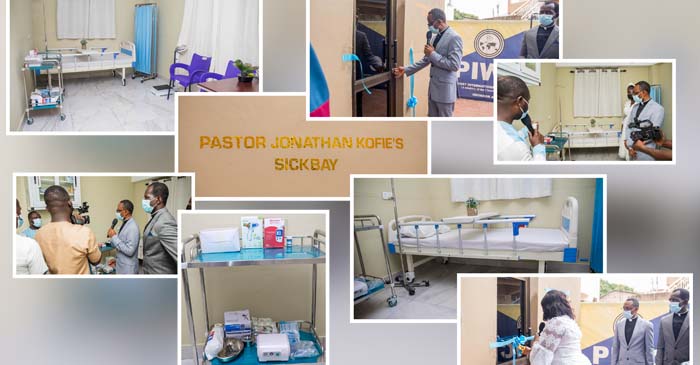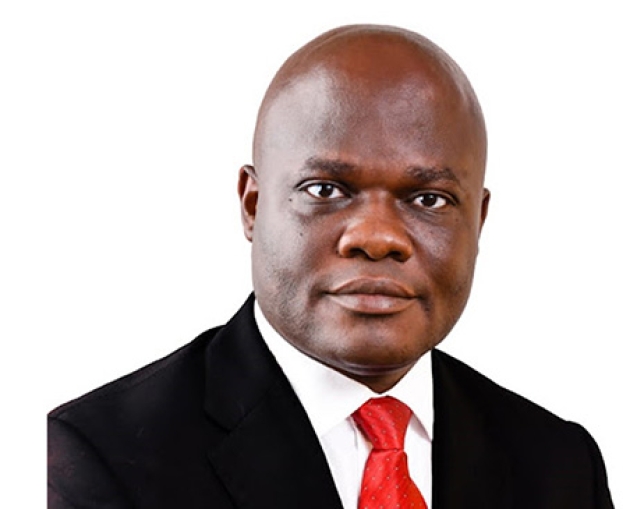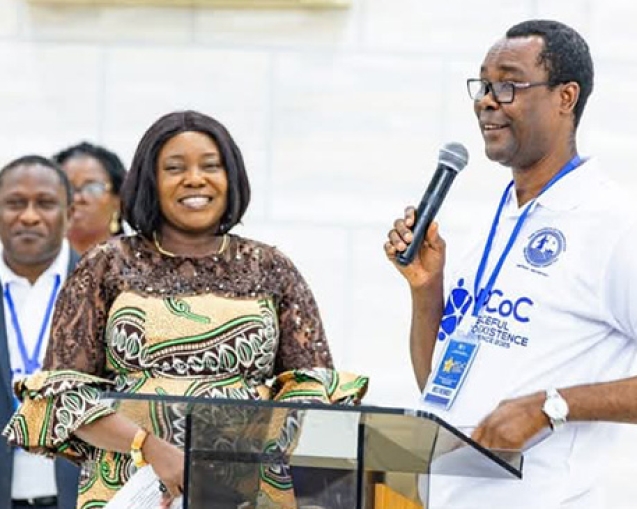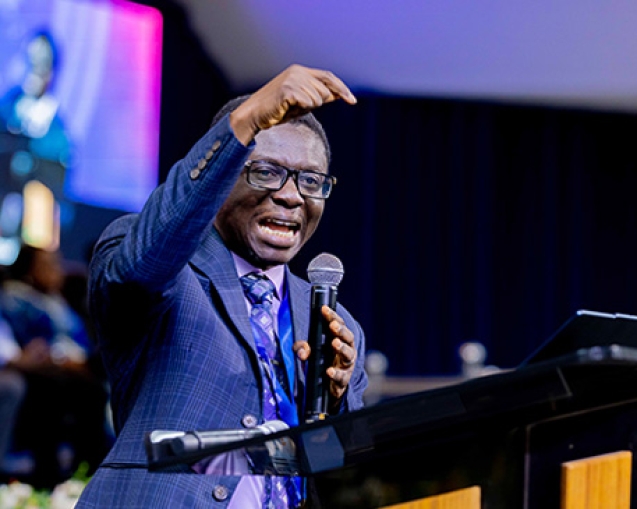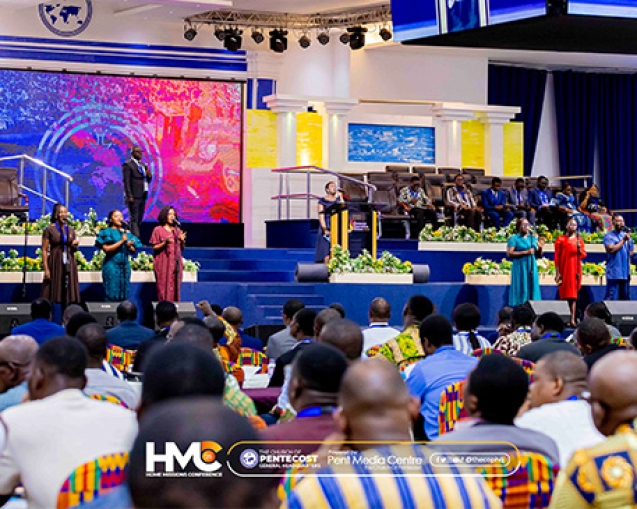The General Secretary of The Church of Pentecost, Apostle Alexander Nana Yaw Kumi-Larbi, on Sunday, October 24, 2021, commissioned and dedicated a sickbay constructed by the Pentecost International Worship Centre, Odorkor (PIWC-Odorkor) at the Church’s premises.
The facility, described as a first of its kind in The Church of Pentecost, is one of the three legacy projects undertaken by the Church as part of its week-long 10th-anniversary celebration.
The facility, which comprises a consulting area, nurses’ station, and a dispensary, has been named the ‘Pastor Jonathan Kofie Sick Bay’ in honour and memory of the late former Resident Minister of the Church.
Commissioning the facility, Apostle Kumi-Larbi commended the leadership of the Church for the project and encouraged other churches to emulate the laudable initiative. He said that the facility would provide medical care for members and also serve as a place where first aid could be administered before an ailing person is taken to the hospital.
The wife of the late minister, Mrs. Regina Kofie, who was also present to witness the ceremony, expressed gratitude to God and the Church for making the project a reality. She also thanked the leadership of The Church of Pentecost for the tremendous support her family has received since the demise of her husband.
Speaking on the topic: “Building Glorious Gates for a Glorious Church” during the Sunday Service before the commissioning, the General Secretary stressed on the need for Christians to examine their lives and repair any ‘broken gate’ that would oppose the collective goal of building a glorious church.
Using Nehemiah 3:1-32 and Nehemiah 12:39 as scripture references, Apostle Kumi-Larbi explained that when the time came for the Israelites to return to Jerusalem after years in exile in Babylon, they came in three batches. The first batch was led by Zerubbabel, who helped to build the temple of God. The second was led by Ezra, who restored the worship of the Lord, whilst the final batch was led by Nehemiah, who saw to the rebuilding of the 12 gates of Jerusalem.
He, therefore, inferred that in building a glorious church, Christians must first understand that their bodies are temples of the Most High God and refrain from ungodly acts that do not bring glory to Him. He further noted that, just like Ezra, Christians must also restore their worship life by ensuring that the relationship between them and God remains cordial at all times.
Dwelling more on the rebuilding of the 12 gates, the General Secretary said that broken gates expose an individual to the attacks of invaders (the devil and his cohorts). For this reason, every Christian must be conscious about repairing any ‘gate’ in their life.
He further noted that Nehemiah was able to mobilise his comrades towards a common goal, and together, they were able to construct all the 12 gates in a record time of 52 days. This, according to him, was because everyone was involved in the work.
“To build a glorious church and be able to accomplish what God has planned for us, there must first be the mobilisation of the people, then ensure that everyone understands and catches the vision, and also, we must all be prepared to put our hands to the wheel,” he charged.
Apostle Kumi-Larbi noted that the first gate to be repaired by the Israelites was the Sheep Gate. He explained that it represents the altar of sacrifice, stressing that, the Christian journey is a life of sacrifice. “The Church we see today is a result of the sacrifices made by our forebears. On the other hand, the sacrifices we are making today would be assessed by future generations,” he noted. He, therefore, urged believers to first offer themselves as ‘living sacrifices’ to the Lord and be willing to offer their resources (time, money, skills etc.) in advancing the Kingdom business.
The next gate to be fixed was the Fish Gate, which, he said, represents evangelism (soul winning). He said that the evangelistic aspect of the church is needful because God has called believers to make them “fishers of men.”
Expounding on the old gate, also known as the Jeshanah Gate, which was the third to be repaired, Apostle Kumi-Larbi said that Christians must hold on to the sound biblical doctrines that the forebears have bequeathed to the church and not allow themselves to be swayed by false doctrines.
According to the General Secretary, the Valley Gate, which represents suffering and humility, also signifies that the Christian life comes with suffering. In view of this, Christians must be prepared to suffer for the sake of the gospel and also humble themselves to serve each other.
The Dung Gate, on the other hand, represents sin and self-cleansing. This, he explained, stresses the need for Christians to do away with sin, and strive to work on their weaknesses.
Apostle Kumi-Larbi also noted that the Fountain and East Gates represent the Holy Spirit and the second coming of Christ, respectively. Explaining further, he said that Christians must rely on the Holy Spirit for strength and guidance in all their endeavours and must also be mindful that the ultimate goal of the Christian life is to make it to heaven.
The historic service, which climaxed the 10th-anniversary celebration of PIWC-Odorkor, was attended by Apostle Dr. Christian Tsekpoe, who represented the Odorkor Area Head, Pastor Felix Okyere Anti (Resident Minister, PIWC-Odorkor), Mrs. Roberta Aseyoro (Wife of the Odorkor Area Head) and Mrs. Gifty Anti (Wife of the Resident Minister)
The service also had some past members of PIWC-Odorkor present, including the Director for the Pentecost Social Services (PENTSOS), Elder Richard Amaning.
The weeklong anniversary celebration, which featured a Prayer Marathon, Music and Drama Night and a Time with Uncle Ebo Whyte, was under the theme: “Building Glorious Gates” (Nehemiah 3:1-32).
PENTECOST NEWS






